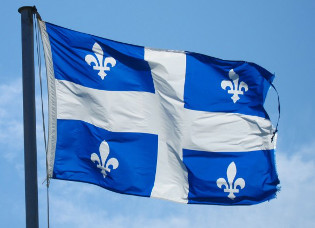
Combing through hundreds of pages of government budget minutiae can be a chore, but if you look hard enough, you might just find something fun and amusing. Now, I am not about to take credit for this because I most certainly did not comb through hundreds of pages of minutiae (but I did spell the word “minutiae”), but those who read the latest budget proposal noticed something interesting: the plan, if passed, would require the province’s internet service providers (ISPs) to block the ability for their customers to access multitudes of online gambling sites.
The banned sites would be included on a blacklist of sorts. But who would draw up this blacklist? Well, let’s take a look at the language found in the budget plan:
For the purpose of curbing illegal online gambling, amendments will be made to the Consumer Protection Act, the Act respecting the Régie des alcools, des courses et des jeux [the RACJ is the Quebec agency that regulates the province’s alcohol, lottery, publicity contests, gambling, racing, and combat sports industries] and the Act respecting [Loto-Québec] so that Internet service providers are not allowed to provide access to an online gaming and gambling website whose name is on a list of illegal sites drawn up by Loto-Québec.
Well isn’t that a coincidence? Loto-Québec, owned by the government, would be the organization in charge telling the ISPs what sites to block. It is almost like the government wants to eliminate all the competition so Québec’s residents have to visit EspaceJeux.com, Loto-Québec’s online gambling site. The government knows that’s what would happen and even essentially admits it, projecting a CAD $27 million increase in revenue generated by Loto-Québec once ISPs go about banning the other gambling sites.
PokerStars, not normally known to be in favor of limiting internet gaming competition, actually loves this budget plan. On the PokerStars blog, PokerStars and Amaya Gaming’s Head of Corporate Communications, Eric Hollreiser, wrote:
We read the budget address with great interest and are happy to see the government seeking ways to work with the private sector to contribute to Loto-Quebec’s growth in online gaming, for the benefit of taxpayers and the protection of consumers. Amaya has been a long time licensed partner of Loto-Quebec, providing it with both online and land-based games and support services. As the global leader in online gaming, Amaya would happily expand its existing partnership with Loto-Quebec to go through the necessary process to become an online solutions supplier accredited by Loto-Quebec and to help define the future online gaming guidelines.
Yes, Amaya Gaming is a licensed partner of Loto-Québec and thus would not be on the blacklist.
Now, it is not necessarily bad that the Québec government would not want people in the province to be hopping on offshore online gambling sites. Restricting people to licensed, regulated sites keeps them safer from both unscrupulous site operators and players who mean to do them harm. At the same time, though, this smacks of government censorship of the internet and could set a dangerous precedent. If the government is allowed to keep people off gambling sites, could it do the same with other types of internet destinations? Additionally, this very well could be putting an unfair, costly burden on the internet service providers.























